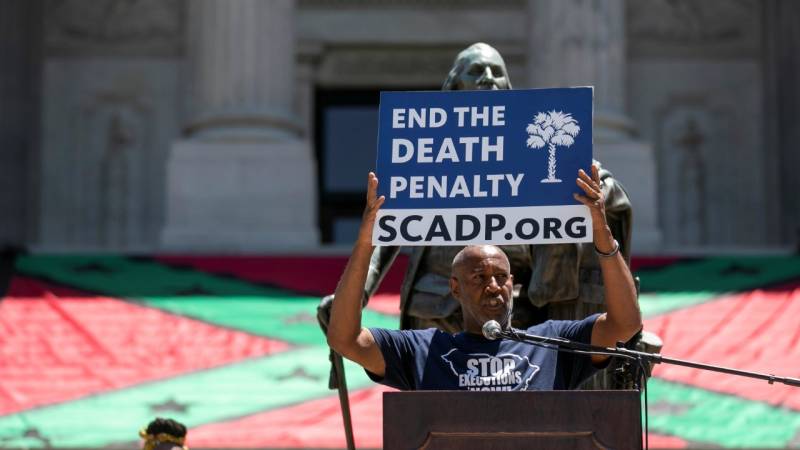Wrongly executed? Director hopes film prompts Biden to curb death penalty

Stay tuned with 24 News HD Android App

Director Patrick Forbes hopes his new documentary "The Phantom" could be the spark prompting President Joe Biden to act against the death penalty thanks to its powerful message: "An innocent man was executed."
The movie, set for a July 2 release, takes a detailed look at the murder of Wanda Lopez, who was stabbed to death one night in February 1983 while working as a cashier in a Corpus Christi, Texas service station.
Just before she died, the young woman had called police to describe a suspect.
The documentary, a reconstitution of the crime in minute and chilling detail, opens with a recording of Lopez's last words: "You want it? I'll give it to you. I'll give it to you. I'm not going to do nothing to you. Please!"
The police, who arrived too late to save Lopez, took off in pursuit of a man who witnesses had seen fleeing on foot. Forty minutes later they arrested Carlos DeLuna, a 20-year-old with a long criminal record. He was hiding under a car.
Feeling certain they had found Lopez's killer, investigators ended the hunt, even as DeLuna vociferously insisted on his innocence. No trace of blood was found on him.
During his trial, DeLuna said he had fled out of fear of being blamed, and said he, in fact, knew the guilty party: a certain Carlos Hernandez whom he had met in prison.
But when shown photos of men by that name, DeLuna was unable to identify Carlos Hernandez. Certain lies he told during the trial further undercut his credibility.
The prosecutor insisted that "Carlos Hernandez" was a figment of DeLuna's imagination -- a "phantom." He was convicted and subsequently sentenced to death.
After all his appeals failed, DeLuna was executed in 1989.
'Tocayo'
Only afterward did the "truth slowly sort of trickle out," director Forbes, who in 2011 made "True Stories: WikiLeaks -- Secrets and Lies," told AFP.
In 2004, Columbia University law professor James Liebman, intrigued by the case, launched an investigation of his own with the help of his law students and a private detective.
They quickly determined that Carlos Hernandez most definitely was a real person. He had died in prison in 1999 while serving a sentence for attacking a woman with a knife -- one of several times he had been arrested while carrying a knife. And he bore an uncanny resemblance to DeLuna.
In 2012, Liebman and his students published an extraordinarily long and detailed article in a respected law journal titled "Los Tocayos Carlos: An Anatomy of a Wrongful Execution." It provided the basis for Forbes' film.
Forbes insists, however, that he began his project without any preconceived opinion of the case.
"This movie would be fatally flawed, if it was purely, you know, an advert for the death penalty campaign," he said.
He methodically tracked down key figures in the case -- not only police, prosecutors, lawyers and witnesses but also some of the women who were victims of Hernandez's violence and who, years later, still feel traumatized by it.
One of them told Forbes that Hernandez had bragged to her about killing Wanda Lopez and getting away with it thanks to his "tocayo," a Spanish word for someone with the same name.
'Every mistake'
Forbes now feels he has a firm grip on the truth of the sordid case: "It's a horrible one, but it's a very human one. You know, people make mistakes," he said.
"The thing about this case," Forbes added, "is, every mistake that could have been made, was made."
He places much of the blame on a legal system that fails to provide equal protection to the poor and minorities.
"The perpetrator of this crime is a poor Hispanic man, the innocent guy who is executed is a poor Hispanic man, none of them were going to be given a fair crack of the whip."
Forbes hopes his film will not only help, belatedly, to clear DeLuna's name but also lead to wider change.
That's why he agreed to let "The Phantom" be used in support of a petition demanding that Biden commute the death sentences of anyone in federal penitentiaries.
During last year's Democratic presidential primary campaign, Biden said he opposed the death penalty. But since taking office he has yet to match words with action.
Instead, his Justice Department recently argued for the death penalty for one of the two men behind the 2013 Boston Marathon bombing.
Forbes hopes new attention to the DeLuna case will nudge Biden to act.
"Wouldn't it be fantastic," he asked, if his movie "actually resulted in some concrete change?"
